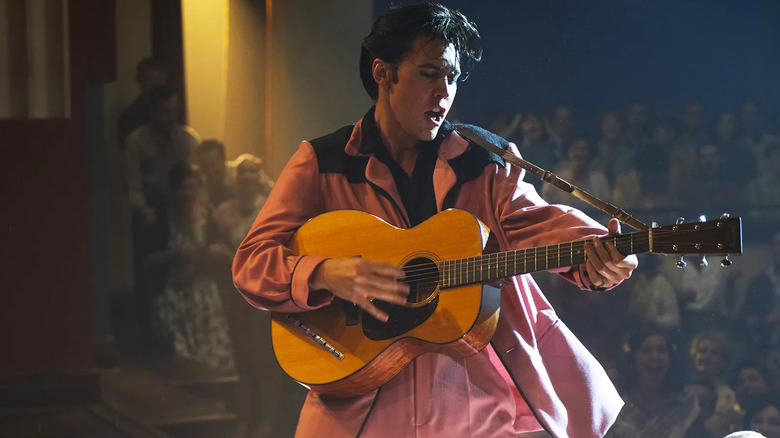Why Baz Luhrmann Almost Abandoned The Idea Of Making Elvis
Nearly a decade after revitalizing the phrase "old sport" with his adaptation of "The Great Gatsby," Baz Luhrmann is returning to the big screen with yet another over-the-top cinematic experience — his musical biopic of the King of Rock and Roll, "Elvis." This one has been a long time coming. Not just because Luhrmann's eccentric filmmaking style is a perfect match for the legendary performer, but because the director has been aching to helm this story for years. The project was first announced way back in 2014, then fell to the wayside until 2019 when Tom Hanks signed aboard to star as Colonel Tom Parker. Then, after years of moving "Elvis" from one burner to the next, it finally came time for the cameras to start rolling in 2020 — which you might remember as the year that life fell apart around us.
After a decade in development, "Elvis" ended up one of the first productions struck by the pandemic when star Tom Hanks contracted COVID-19 in 2020. While chatting with IndieWire last month, Luhrmann recounted: "It's really hard to remember just how naive the world was. We had no idea. That Covid thing was like a bomb with Hazmat suits and we got locked down."
Initially, Luhrmann thought the movie was in danger of being shut down entirely — and in the earliest days of the pandemic lockdown, even that grim reality had a silver lining:
"At first I loved it, because there was so much pressure on me. I felt like, 'Have I really got this wrangled?' I was with my kids and everything. I used to dress up every night and have crazy dinners and go like, 'Wow, maybe I don't have to make the movie.' You know, I'm off the hook again."
How the interruption worked in Elvis' favor
Amid other Hollywood productions (and the rest of the world) shutting down for the sake of safety, it was difficult to tell how long the pandemic's effects would last. Tom Hanks tried to be a voice of reason, telling the Luhrmann, "Well, maybe we can wait until February when it's all over." But according to the director, "the film was absolutely slipping away." While the shutdown certainly helped to relieve the immediate pressure of making the film, it stood no chance against Luhrmann's determination to tell the story. He added:
"I'd been talking about using Elvis as a way of exploring America. And then at some point, Warners buys the estate thinking I'm going to do it. Actually, the world had changed to this idea of the commercial carnival barker figure who puts his name on everything and knows how to exploit people and emotions and the artist. This suddenly became relevant to me: 'Well, hang on, this is really important.' So I came back to the idea of doing it."
Another major factor in this equation? A Baz Luhrmann film is no small undertaking. Luhrmann is a maximalist director: the kind of spectacle that "The Great Gatsby" and "Moulin Rouge" put on display doesn't come easily. The elaborate choreography and dazzling set pieces wouldn't be possible if not for the long process of their creation. So while the added wait was hard to swallow, having extra time ended up serving Luhrmann well. He returned to the script, restructuring the entire first act and altering the story from linear to something much more layered.
It certainly paid off: in his review, /Film's Rafael Motamayor described "Elvis" as "the Baz Luhrmanniest film Baz Luhrmann has made yet, a compilation of his greatest filmmaking hits, all employed for a film as excessive and grandiose as Elvis himself."
"Elvis" arrives in theaters on June 24, 2022.

